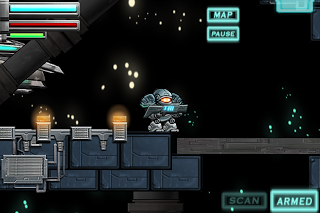Pawn’d – 0.99 (Headlight Software, Inc.)
This Friday post comes with good news! Secret Base’s iOS debut title, Tobe & Friends Hookshot Escape is officially launching on March 1st. I have not yet played the original Tobe computer games (Vertical Adventure, Hookshot Escape…), but I believe the gameplay is just about the same. After playing through Hookshot Escape, I must say that I am blown away by how well the controls work and also by the gorgeous yet simplistic artistic design.
We will have a full review on release day, but I’ll spoil some things for you to get you by. First thing you need to know is that there are a ton of unlockables. A ton. This game will keep you busy for a long time. Second, this game is HARD. You might think otherwise when you get your hands on Hookshot Escape, but in my mind this game is downright difficult. But keep in mind that every fall and every mis-step keeps you coming back for more. So far, Tobe & Friends Hookshot Escape feels like the perfect blend of hardcore platforming/hookshotting and a good time. That’s all I’m going to say for now. Check out the trailer and screens and mark March 1st on your calendars!

Submit your entries before the 1st of March.
Back in December, we heard about an upcoming platformer of sorts named Heroki from Picomy Games. From the info that we have, Heroki won’t be your standard platformer.
The game will be based around a flying mechanic, giving players greater freedom to go where they please. One detail that I want to hear more about is the ‘Flow Motion Control’ scheme. This sounds like a streamlined virtual control scheme which, if it works well, should make the game totally awesome.
The reason why I call Heroki a pseudo-platformer is because there it sounds like there is so much more to it. Apparently, there will be 5 large worlds to explore. In each world Heroki will learn a new ‘ability’ which will then drastically alter the gameplay. This aspect of the game is very intriguing and I can’t wait to see how it all pans out.
Also, at any time in the game Heroki will be able to warp back to a “home base” called Levantia which will house NPC’s and shops. While in Levantia, you can perform side quests like treasure hunts as well as buy/sell things at the shops.
Heroki really seems to be shaping into a huge project and I will be eagerly following the game’s progress. Let’s all hope Picomy Games comes through with a major success on this title. Until we hear more info, enjoy the console-esque artwork showcased in the screens and teaser trailer.
Around Thanksgiving last year, Deepworld, a new massively-multiplayer 2D crafting game, was announced to the world. Even though only 2 screen shots were revealed at the time, it was more than enough to pique my interest. Now 3 months after its announcement, the first gameplay trailer has been released. Gameplay seems similar to that of Junk Jack in many respects, but the appeal of the game is completely different. The style, like the devs said is more steampunky, and it creates a sort of dark and grungy atmosphere. Anyway, if you haven’t seen the screens yet, they are posted below. Have a look at the trailer and head over to the Deepworld forums if you want to get ready for the beta. We’ll be watching for more news!